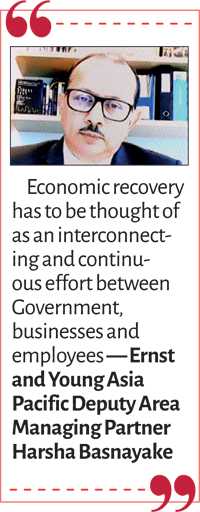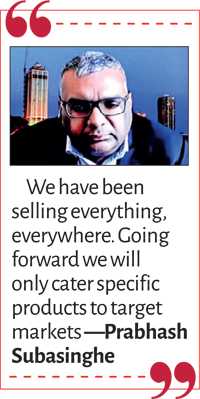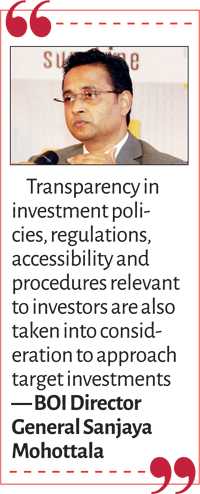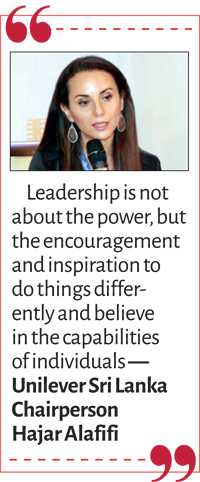Thursday Feb 26, 2026
Thursday Feb 26, 2026
Tuesday, 8 December 2020 02:48 - - {{hitsCtrl.values.hits}}
By Charumini de Silva
A select set of business leaders last week shared in their view the best and multiple role the private sector could play to drive economic recovery post-COVID pandemic with supportive policies from the Government.
The list though exhaustive was focussed and included a changed mindset, more partnerships, targeted products, diversified markets, building brands with purposes, inculcating sustainable practices. The business leaders said coordinated and supportive economic policies from the Government would help Sri Lankan businesses to reset their direction in post-COVID economic revival.
The specific role of the private sector came under discussion at the Ceylon Chamber’s Virtual Economic Summit and business leaders said that the Government should provide all necessary support tools, but allow the private sector to become the power engine that will move forward aggressively and develop new industries.
 |
 |
 |
 |
 |
Reframe long-term policies, no short-term politics
Ernst and Young Asia Pacific Deputy Area Managing Partner Harsha Basnayake said that Sri Lanka needs to reframe its long-term sustainable policies with short-term policies for the private sector to move ahead.
“Economic recovery has to be thought of as an interconnecting and continuous effort between Government, businesses and employees. Unless we galvanise our policies with new partnerships with all stakeholders, the recovery would be much harder,” he said, adding that revival would only happen if both Government and private sector worked together.
Basnayake also highlighted that uncoordinated economic policies, disruptive politics, high debts, high expenditure and heavily-traumatised society resulted in Sri Lanka falling behind as an unattractive destination for Foreign Direct Investments (FDIs) and no coordinated strategy to respond to mega trends such as technology, shifting trade flows and climate change were key economic conditions when COVID-19 landed on Sri Lanka’s shores.
“Dependency on agriculture, tourism, garments and overseas remittances had made the economy vulnerable to external shocks, while not being able to introduce any new industries as a strategy to diversify economy are main reasons for this state of the economy,” he said,
He insisted that this could be exploited as a time for Sri Lanka to reset its long-term goals, making use of the crisis with an opportunity mindset and an obligation on business to reset their purpose for broader interest of stakeholders.
In shaping Sri Lanka’s long-term goals and defining the new normal Basnayake said global order, societies and economies, business and markets as well as household and individuals had to be considered.
“We must be able to create trust, ingenuity, change in habits, focus on mental health and ethics. Purpose of a business today is to profitably solve problems of people and the planet, and not profiteering from creating problems for the wider society,” he said.
Enhance business via exports
As the Government had recognised exports as a thrust sector for economic revival and growth, Prabhash Subasinghe, Chairman, Export Development Board (EDB) until last week, said changing mindset, managing expectations and adopting sustainable practices would help Sri Lanka differentiate and be where it truly belongs.
In that context, he said that exporters needed to have deep research and analytical skills to craft customised business cases to differentiate from other countries seeking a piece of the same pie.
“Local industrialists are quite narrow in their thinking. Tariff protection and costs are no longer successful methods to survive and thrive industries. You need to reinvest, produce globally competitive, niche and sustainable products while building brands with authentic stories that have a purpose,” he said.
He pointed out that the pandemic had changed the business world in many ways with laser focus on lean structures, innovation, customer focus and liquidity management to ensure survival and thrive through any macro conditions.
Diversifying the current product base and markets, while exploring other opportunities in sustainable methods, partnerships, e-commerce, digital presence and reverse brain drain with private sector education centres to ensure sufficient skilled labour were highlighted as key factors in going forward.
“Sri Lanka has an outdated product basket with no future-proof industries. We have been over dependent on the US and EU markets for decades. Diversifying product base and markets are low hanging fruits. We need globally competitive products, niche products, create new joint ventures and partnerships, knowledge on all sectors and embark into new products and market segments,” he added.
Subasinghe said the country desperately needed knowledge and capital to increase its current export contribution to the GDP from 20% to 100%.
He described COVID-19 as a blessing in disguise, as Sri Lanka was able to accelerate the digitisation of the economic activities because of the pandemic. “We have been trying to digitalise economic activities for decades, yet the progress was very slow. But due to the pandemic everyone was left with no option, but to convert and adapt,” he said.
Noting that the disruptions caused by various technologies had been accelerated with use of data, AI, contactless payments, branchless banking, use of chat-bots, automated solutions in manufacturing Subasinghe said the private sector needed to embrace and utilise these new technologies to get closer to their customer and grow their base.
EDB has selected rubber products, seafood and aquaculture, pharmaceuticals, agriculture, ICT/BPM and electronic and electrical as potential sectors to drive export development, therefore he called on the private sector to take advantage of the support extended to develop their exports.
Subasinghe said that EDB would only focus on specific products and markets in future, noting that this year only focused on targeted sales and it had been a successful measure to stay afloat during the uncertain and challenging times. “We have been selling everything, everywhere. Going forward we will only cater specific products to target markets,” he added.
As trade war between China and the US and the pandemic has given rise to supply chain risks with sole dependence on China for the majority of the supplies, he said has led to a supply chain redraw. “Sri Lankan exporters should be the logical choice for companies seeking alternate manufacturing or sourcing locations. This is an opportunity not to be missed like in the 1980s and 1990s,” he stressed.
Explore PPPs
Overseas Realty Ceylon Plc CEO Pravir Samarasinghe said Private-Public Partnerships (PPPs) were the catalyst to grow the construction sector.
He claimed that during the past five years the construction industry slowed down sharply where it even recorded negative growth in the last two years due to high taxes, high interest rates and slowdown in economic activities.
Samarasinghe pointed out that other than for affordable housing, there was no demand for other property and real estate investments at present.
“There is a huge demand for affordable housing projects in Colombo and greater Colombo from the low and middle income market segment, but those projects are only viable if we consider PPPs where the Government provides land and private firms develop it,” he said.
Noting that there was no short to medium term interest for property and real estate, he said introducing tax holidays would be the only way to mobilise investments into identified sectors, particularly in the industrial and warehouse properties in the path to recovery post COVID-19.
Samarasinghe said there was an unsold stock of around 8,000 luxury housing units currently, pointing out that it was very challenging to attract investments into this market segment. “Apart from the projects that are ongoing, there are hardly any other investments for the new luxury housing segment,” he stressed.
He said high costs involved in supply of material was another challenge the construction industry had been grappling with for years.
He also said that there was some hope now with budgetary allocations for the upcoming infrastructure projects the Government planned to kick off in the next few years.
“There is some degree of revival, but capital is a major constraint,” he added.
For a holistic recovery, Samarasinghe suggested it was critical to get all key enablers to work together in partnerships.
Structured approach to attract FDIs
Board of Investment (BOI) Director General Sanjaya Mohottala said Sri Lanka could leap forward to a knowledge and investment driven economy.
He said the comprehensive strategy was focused on prioritised sectors, with a structured approach to attract target oriented Foreign Direct Investments (FDIs) and to spur economic growth.
“Transparency in investment policies, regulations, accessibility and procedures relevant to investors are also taken into consideration to approach target investments,” Mohottala added.
He also highlighted the importance of a supportive legal and regulatory framework – strong fiscal, financial and regulatory incentives and a stable regulatory regime; labour force – availability of skilled labour force at competitive cost; and enabling factors – availability of well-developed infrastructure and strong investment promotion agency.
Mohottala stressed that the skills sector of Sri Lanka required a re-thinking and re-engineering, in order to accommodate the new normal of the post-COVID period. “Re-skilling and up-skilling of employees will be addressed in our action plan to cater significantly into a production system, where they would competently meet the challenges of producers and manufactures who might demand the type of labour and skills,” he added.
He pointed out that however much stakeholders discuss these issues, the essence was in implementation. “We need both the public and private sector to work together,” he added.
Leadership
The post-COVID-19 workplace will not look the same in every country or industry, but the pandemic presents both challenges and opportunities. In this context, Unilever Sri Lanka Ltd. Chairperson Hajar Alafifi said right leadership was of utmost important in these volatile times.
“Leadership is not about power, but encouragement and inspiration to do things differently and believe in the capabilities of individuals,” she said.
She said it was the responsibility of the companies to adjust their skillsets accordingly; to pay well, look after its employees, allow teams to drive different projects and maintain diverse gender balance to empower them.
“One of the ways a team achieves high performance is by deciding together how to work together, make well-being a priority and foster a sense of belonging,” she added.